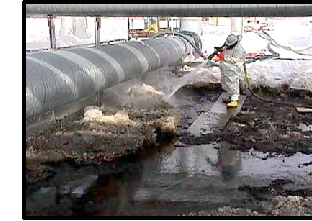

|

|

|

|
|
|
| |
|
|
|
Senate Majority Leader Tom Daschle may have written off George W. Bush's plan to open up the Arctic National Wildlife Refuge to oil drilling as "a dead issue." But Interior Secretary Gale Norton hasn't cried uncle just yet. In mid-June, Norton flew to Alaska to visit the refuge, hype its energy potential and reassure anxious oil industry execs. Norton also attempted to buy off the Gwich'in tribe, who live near the refuge and hunt the caribou herd that use the arctic plain as a calving ground. The Gwich'in treated Norton hospitably, treating her to a banquet of moose, but told her emphatically that they were unalterably opposed to drilling in the refuge. "We've lived off this herd for thousands of years," said Faith Gemmill, head of the Gwich'in Steering Committee. "We know how they react to human intrusion. If the calving grounds are destroyed, our future is gone." Norton tried to reassure the Gwich'in, telling them that the oil industry had improved its drilling techniques and that they would use ice roads that melt away with no trace in the summer months. But tribal chief Evon Peter reminded Norton that only a few weeks earlier, a massive oil spill had occurred at Phillips Petroleum's Kuparak site, where 92,400 gallons of saltwater laced with crude oil poured onto the Alaskan tundra. It was one of the largest oil spills ever on the North Slope. Norton left Arctic Village frustrated. During a speech in Anchorage, she said the
Norton isn't the only one beginning to show signs of desperation. In March, Alaska Sen. Frank Murkowski, a millionaire who owns stock in several oil companies active on the North Slope, personally financed a survey of Alaskans on drilling in ANWR. Not surprisingly, the results showed more than 70 percent support it. Of course, they have a financial stake in the matter. Each resident of Alaska gets an annual check courtesy of royalties paid to the Alaska Permanent Fund by the oil companies. Last year, each check was for a record $1,964. But national polls are nearly the opposite of Murkowski's Alaska survey. Nearly 60 percent of Americans oppose drilling in the refuge even if oil prices continue to climb. All of this seemed to unnerve the senator. On his final day as chairman of the energy committee, Murkowski strode to the well of the Senate with an array of maps and flip charts to perform a 20-minute rant worthy of King Lear. "The change in the Senate leadership doesn't diminish our responsibility," Murkowski screamed. "The fact is that we still have an energy crisis. The fact is we simply can't solely conserve our way out of this crisis. The fact is supply must still meet the demand. What have the Democrats proposed? You don't see anything in increasing production." After Norton's visit to Alaska, she huddled with Murkowski and oil industry execs to draw up a new game plan. Their first move was to beef up Norton's staff by bringing on board two seasoned Alaskans with intimate ties to big oil, Drue Pearce and Camden Toohey. Pearce, who will become Norton's senior adviser for Alaskan affairs, is currently a state senator. She has worked for the Arctic Slope Regional Council and the Energy Council, an international oil lobby. A payback may be involved here. Pearce played a key role in convincing the Alaska legislature to pay Norton $60,000 last year to write a legal brief for the state's appeal of the precedent-setting Katie John ruling, which was a victory for tribal rights. Norton's brief asserted that the Interior Department cannot ensure subsistence hunting and fishing rights of native Alaskans by designating navigable waterways as public lands. The Ninth Circuit Court rejected Norton's far-flung argument. Toohey will serve as Norton's special assistant in Alaska. He is currently director of Arctic Power, a joint venture between the state of Alaska and the oil industry that lobbies for increased drilling and exploration. At Toohey's request, the Alaska legislature recently appropriated nearly $4 million to bolster Arctic Power's lobbying efforts on ANWR. Neither appointment requires congressional approval, a fact that galls Rep. Edward Markey, the Massachusetts Democrat who is leading the fight against drilling in ANWR. "This appointment, which places a lobbyist for the oil industry in charge of our public lands in Alaska, is breathtaking in its arrogance toward the public interest, and a new low point for the Bush administration," Markey says. "What better place to carry out the agenda of Arctic Power than from the office of the Interior Secretary herself?" But Toohey's appointment may be a shrewd move, designed to exploit splits between the labor-green coalition. At Arctic Power, Toohey successfully garnered support for expanded drilling on the North Slope from big labor, including the Teamsters and the AFL-CIO. Indeed, Mano Frey, executive president of the Alaska AFL-CIO, rushed to Toohey's defense, saying he didn't understand the criticism. The other part of Norton's new Alaska oil plan may be even more
devious. While they will continue to push to open ANWR to drilling,
Norton intends to direct the Interior Department to speed up permitting
other oil and gas operations in Alaska. There's a lot more oil in
the National Petroleum
Reserve, the Gulf of Alaska and the Beaufort Sea than there
is inside ANWR--and it's much easier to get to with public attention
fixated on the fate of the refuge. "All in all it's turning out
to be a love fest for the oil industry," says Pam Miller, director
of Anchorage-based Arctic Connections. "Clearly, Norton's main priority
is to help big oil."
|


